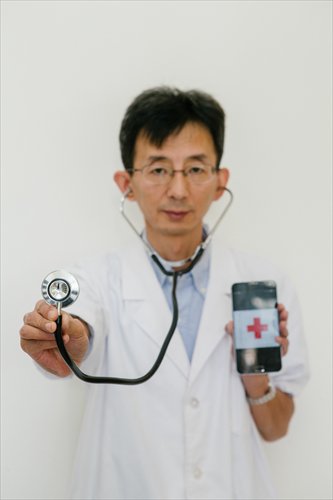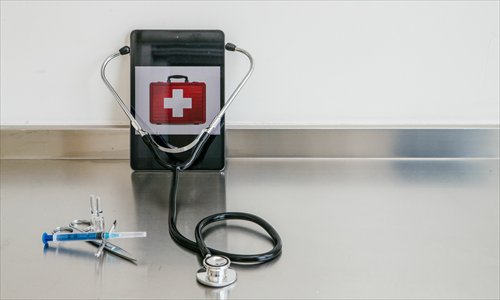Mobile medicine
Online apps can’t replace face time with doctors

More people are turning to online health apps for convenient and direct communication with doctors. Photo: Li Hao/GT
Chen Sisi was trying to get to the bottom of her father's health problem for months.
But instead of resorting to conventional hospital visits, Chen, a teacher working in Beijing, chose another route.
"Hello Dr Li, my father has been having pains in his right leg for over three months, but we do not know what is causing it," she wrote in the dialogue section of an online health app.
It was not long before she received the response: "You said in the descriptions that your father had a car accident 20 years ago. From the CT and MRI scans, I think it might be necrosis of the femoral head," said Li, an orthopedist in one of Beijing's triple-A hospitals.
After a discussion, the doctor recommended that Chen's father have a more thorough assessment and undergo an artificial femoral replacement operation in the hospital where Li works.
The mobile health (m-health) care industry is developing fast in the country. Like Chen, more people are turning to online health apps for its convenience. It's an easy and direct way to communicate with doctors from the top hospitals rather than waiting for months for an appointment to see a specialist for a short consultation.
Recent years have seen the rise of many online health apps in China, including Chunyu Yisheng, Haodaifu and Baidu Yisheng. They provide various functions including registration, online purchase of medicine, counseling and guidance with doctors.
According to a report from sohu.com, up until April this year, about 90 million Chinese had benefited from the m-health apps thanks to the remote consultation option with professional medical staff. But experts point out that the apps have limitations and cannot replace traditional face-to-face treatment.

M-health faces the dilemma of not being able to connect with the information systems of some hospitals. Photo: Li Hao/GT
Connecting doctors and patients
After knowing her father's condition, Chen first wanted her parents to travel from their hometown in Jiangsu Province to Beijing, to see a doctor in a triple-A hospital.
However, before they departed their hometown which is about 1,000 kilometers away, Chen found it was almost impossible to get an appointment with a specialist at one of these hospitals. "Many are booked-up two months in advance."
Fearful that his condition could worsen in the long term if left untreated, Chen decided to turn to an online health app, in the hope of getting a diagnosis from a top hospital.
Chen was required to provide useful information to make a diagnosis, such as her father's medical history, test and scan results. The online assistant also advised which hospital department she should visit, and recommended doctors who are good at treating this condition.
Finally Chen tracked down Li, who has received good reviews online. After communicating with him, her parents traveled to Beijing for an operation.
"Even though it took a week for us to get an appointment with Li, it still saved my parents from making several trips to the city and saved them a lot of time looking for a suitable doctor who is willing to spend time consulting with us patiently for the first time."
Zhao Hui, an attending doctor in the oncology department of the Beijing Obstetrics and Gynecology Hospital, has been registered to consult with users on Haodaifu for almost six months now.
He said online health apps have made his already busy life even busier. But he's still willing to do some online consulting work. "Take patients in Beijing for example, it is routine for many people to get up at three or four in the morning, queue for an appointment and wait to see the doctor until 10 am, which is like fighting a battle. M-health is good news for them, especially those in rural and remote areas."
Zhao said some doctors from well-known international hospitals have also started consulting on the apps. And m-health has the added benefit of allowing doctors from different hospitals to consult with each other remotely.
"I encourage patients to have their local doctors from hospitals outside of Beijing, join me for a consultation if they are not sure about their diagnosis or need more help from me."
Supplementing traditional medicine
Of the many patients who request Zhao's help, he decides who to treat whether online or offline, depending on their situation. "Some situations are suitable for online counseling, but others are not. For those who want a second opinion on their test results from a medical organization or those who receive treatment in my hospital and have some follow-up issues, it can be done online."
Zhao advises many of his patients who have consulted with him face-to-face, to keep in contact with him via the app because it is more convenient for follow-up and advice about their recovery.
But Zhao was quick to point out that although m-health care has become convenient for both doctors and patients, and even improved their relationships, it will not eventually replace traditional medical care.
"There are risks to not seeing a patient face-to-face. So, on many occasions, I will advise them to go to the hospital for a systematic diagnosis and treatment. In this way, we can get first-hand information."
Xu Hongjun, chief dermatologist at Beijing's Civil Aviation General Hospital, has used Haodaifu, Purple Clinic and other m-health platforms since last March. He has "seen" around 7,000 patients through Purple Clinic so far.
Xu agreed with Zhao. "Some people think many dermatological problems can be solved online from pictures or videos and that you can easily make a diagnosis. But they are wrong," he said. "Those online apps can only diagnose some most common problems, not difficult and very complicated conditions."
Online challenges
Dai Lian, chief operating officer of Huakang Mobile Healthcare Company which has launched an online health app, said one of the biggest problems facing m-health is not being able to connect with hospitals' information systems. "Only by sharing data and connecting to a hospital network can mobile healthcare be truly mobile. Some hospitals have started cooperating with m-health companies by linking their information systems to the apps. But many hospitals do not want to make their data available, for fear of information leaks."
"An ideal model is that by using the apps, patients can view their electronic medical record, check-up forms and prescriptions at any time. If they 'visit' another doctor online, they do not need to upload a lot of documents and describe their conditions again."
According to a report by news website jiemian.com this year, Ali Health, a healthcare company under the Alibaba Group, has been cooperating with several hospitals in China, including the Beijing Military Region General Hospital, to share electronic prescriptions. Some hospitals have even taken the initiative to launch their own m-health apps.
Beijing Union Medical College Hospital launched the first edition of its app in September, the official website of the People's Daily reported. The second and third editions are expected to launch further functions such as being able to check treatment records, costs, and queue updates .
But the m-health industry is also not without legal risks. According to China's medical law, doctors can only diagnose and treat people in medical organizations including hospitals.
"So it is legally risky to consult patients online. The lines are blurred. If I make a wrong diagnosis, who will take responsibility?" said Xu.
Xu said some m-health companies have set up a legal advisers' team to deal with such issues. Others have offered insurance to doctors.
He Chao, a freelance medical writer and online celebrity with more than 200,000 followers on Sina Weibo, stressed that m-health is also not the answer to the tight medical resource problems in China. "It can relatively alleviate the strained medical resources by optimizing the process to improve efficiency, solving some patients' basic problems online and guiding some to local hospitals. But it cannot solve the fundamental problems."
He said patients still struggle to get an appointment online, because the number of specialists remains unchanged. "Compared with Western countries, China has enough hospitals and medical organizations and advanced medical equipment, but the system is not feasible. Many people swarm to the triple-A hospitals rather than primary hospitals. So the fundamental solution should be improving the skills and quality of doctors."
"After an overhaul of the industry, those [m-health companies] which can connect with the information system of hospitals may be able to survive," said Xu.
Mao Lingye contributed to this story